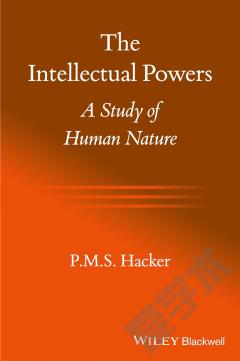The Intellectual Powers —— A Study of Human Nature
----- 知识分子的力量:人性研究
Preface Introduction: The Project Prolegomena Chapter 1 Consciousness as the Mark of the Mental 1. Consciousness as a mark of modernity 2. The genealogy of the concept of consciousness 3. The analytic of consciousness 4. The early modern philosophical conception of consciousness 5. The dialectic of consciousness I 6. The contemporary philosophical conception of consciousness 7. The dialectic of consciousness II 8. The illusions of self-consciousness Chapter 2 Intentionality as the Mark of the Mental 1. Intentionality 2. Intentional objects 3. The central sun: the relation of thought to reality 4. The first circle: what do we believe (hope, suspect, etc.)? 5. The second circle: the relation of language to reality 6. The third circle: the relation of thought to language 7. The fourth circle: the epistemology of intentionality 8. The fifth circle: meaning and understanding Chapter 3 Mastery of a Language as the Mark of a Mind 1. A language-using animal 2. Linguistic communication 3. Knowing a language 4. Meaning something 5. Understanding and interpreting 6. Meaning and use 7. The dialectic of understanding: the mystery of understanding new sentences Part I The Cognitive and Doxastic Powers Chapter 4 Knowledge 1. The value of knowledge 2. The grammatical groundwork 3. The semantic field 4. What knowledge is not 5. Certainty 6. Analyses of knowledge 7. Knowledge and ability 8. Knowing how 9. What is knowledge? The role of know in human discourse Chapter 5 Belief 1. The web of belief 2. The grammatical groundwork 3. The surrounding landscape 4. Voluntariness and responsibility for belief 5. Belief and feelings 6. Belief and dispositions 7. Belief and mental states 8. Why believing something cannot be a brain state 9. What is belief? The role of believe in human discourse Chapter 6 Knowledge, Belief and the Epistemology of Belief 1. Knowledge and belief 2. The epistemology of belief 3. Non-standard cases: self-deception and unconscious beliefs Chapter 7 Sensation and Perception 1. The cognitive powers of the senses 2. Sensation 3. Perception and sensation 4. Sensation, feeling and tactile perception Chapter 8 Perception 1. Perceptual organs, the senses and proper sensibles 2. Perceptual powers: cognition and volition 3. The classical causal theory of perception 4. The modern causal theory of perception Chapter 9 Memory 1. Memory as a form of knowledge 2. The objects of memory 3. The faculty and its actualities 4. Forms of memory 5. Further conceptual links and contrasts 6. The dialectic of memory I: the Aristotelian legacy 7. The dialectic of memory II: trace theory Part II The Cogitative Powers Chapter 10 Thought and Thinking 1. Floundering without an overview 2. The varieties of thinking 3. Is thinking an activity? 4. What do we think in? 5. Thought, language and the language of thought 6. Can animals think? 7. The agent, organ and location of thinking 8. Thinking and the inner life Chapter 11 Imagination 1. A cogitative faculty 2. The conceptual network of the imagination 3. Perceiving and imagining 4. Perceptions and imaginations : clarity and vivacity of mental imagery 5. Mental images and imagining 6. Imagination and the will 7. The imaginable, the conceivable and the possible Appendix: Philosophical Analysis and the Way of Words 1. On method 2. Methodological objections and misunderstandings Index
{{comment.content}}








 京公网安备 11010802027623号
京公网安备 11010802027623号